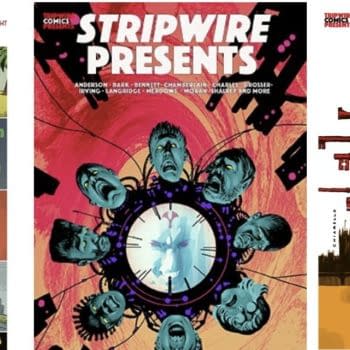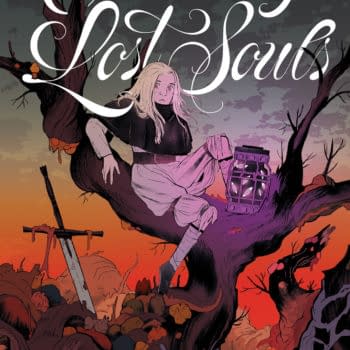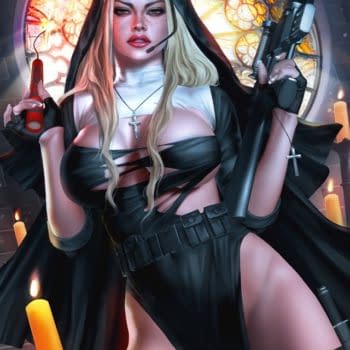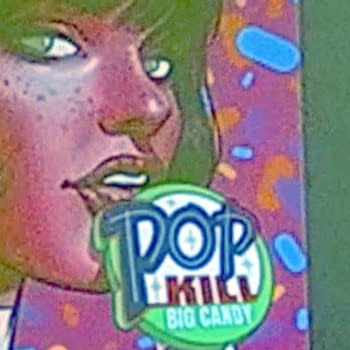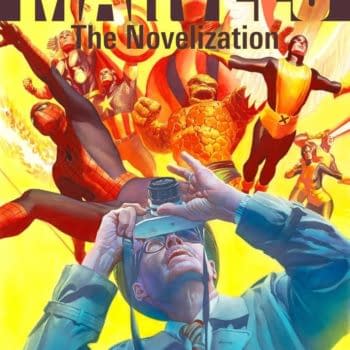Posted in: Comics, san diego comic con | Tagged: alison bechdel, batwoman, bi, comic con, Comic Con International, dragon age, fun home, gay, geek year in review, lesbian, LGBTQ, midnighter, san diego comic con, sophie campbell, trans
SDCC '15: LGBTQ Geek Year in Review
By Joe Glass

A fun panel discussing the LGBTQ related geek news that broke into mass media, it was hosted by Prism Comics board member and creator of Web of Lives, P. Kristen Enos and panelists included Diane Anderson-Minshall (The Advocate, Queerly Beloved), Amber Garza (Geeks Out, Flame Con), Matt Kane (GLAAD), Chelsea Steiner (AfterEllen.com) and Sean Z. Maker (comics creator, Bent Con).
Getting some info and news out of the way to start, Maker pointed out there is a Kickstarter for his latest project, Myth, and Amber Garza broke the news that after their first highly successful Flame Con, a LGBTQ Comic Con in New York City, the event will be returning next year and now as a two day event!
The purpose of the panel is to run through the key newsworthy moments of the last twelve months and have a brief discussion on each and what that may mean for us gay geeks as a whole.
Starting off with the musical version of Alison Bechdel's graphic novel auto-biography, Fun Home, which won FIVE Tony Awards as well as having one of the shows key songs featured in a live performance on the nationally televised event, with even more footage available on YouTube.
Next up was the fairly recent video DC put out for Pride month, highlighting their LGBTQ characters and history. Anderson-Minshall noted that Extrano, whilst a milestone, was by modern standards quite offensive, but certainly he was still an early gay character, even if they could not immediately come straight out and say it. Kane felt the video came across as very defensive on DCs part, especially given their image on queer things of late, and noted, to applause, how it would be great if they could include a trans led book.
This brought the group onto the cancellation of Batwoman, a book that only last year this panel was praising, if noting it's controversial on DCs part to ditch the gay marriage plotline in the series. This was touched on again, before moving to the final arcs controversy of its own, as many, if not most, fans felt there was an undesirable and unwanted rape plotline involved.
The group mused on how the climate has become such now that whereas in the past a queer audience may have felt they had to purchase any and all books featuring queer characters , whether or not they were good or had things they disagreed with in them, just to show support and keep those çharacters and books going, now we feel we can take a moral view on our purchases more as LGBTQ representation continually increases.
Garza: 'We are a marketing force to be reckoned with now'
Anderson-Minshall did hasten to point out that in this case we were largely considering gay and lesbian representation, as there is still a vast under-representation of bisexuals, trans and queer character of color.
Whilst Batwoman was cancelled, we have seen the launch of Midnighter, to much praise. The panel very much thought that both could (and maybe even should) have been on the market, that the LGBTQ Geek dollar was enough to support both.
Moving on to the coming out of Catwoman and Iceman, much of the discussion revolved in particular around Iceman and how some read it as bi-erasure, and other theories as to how it will be resolved (the seeming difference in sexualities between young and adult Iceman) in Uncanny X-Men 600.
Maker said for him it felt a very true situation. He sees Iceman as a closeted gay man. As a gay man who used to date women himself, he did it for the wrong reasons, so he takes Iceman's situation and experience personally.
Kane did point out that representations of bisexuals in the media are awful, often seen as villains or untrustworthy, and biphobia and bi-erasure is prevalent, which naturally would lead to such angry assumptions about this storyline. Steiner added how she feels like bisexuals are the last part of the community it's ókay' to make fun of.
They then briefly and hilariously discussed mobile game Asshunter, a game developed and available online, whose mission parameters included to kill or evade gays, lest they have their way with you. This game was available on Google Play, and only removed after it had been downloaded 10,000 times.
Maker felt he was not surprised that such a game was made, as he feels it's very much been the culture in the gaming community for a while, even if it is one not discussed or highlighted often. Garza was quick to point out that Google did ultimately do the right thing and remove the game, with Kane adding that if the technology is out there available to all to make games, then naturally there will be awful things made, but also amazing things too. It's the nature of things.
Kane and Anderson-Minshall briefly touched on how GamerGate and it's massively exposed controversies is a sign that things are changing within that community, as people with those outdated and disgusting views 'went on the attack'.
Still on video games, the group discussed Dragon Age: Inquisition, to Kane's delight over Iron Bull. Kane's group GLAAD gave the game a recognition award as it opened up a massive audience to discussions and information on the full range of LGBTQ characters and experience.
He felt Iron Bull gave a 'Trans 101' to the player, never before seen in a Triple A game. And the panel agreed it was a sign of modern storytelling in games.
The group discussed quickly a few other topics such as JK Rowling's standing up for LGBTQ rights against the Westboro Baptist Church on twitter, as Steiner coined, she ' Azka-burned' them; and Sophie Campbell's coming out as trans to tremendous reception and support from the comics community and her publisher, the panel feeling that now we're at a time that if someone did voice any negativity they would be blasted as an ' asshole' and risk the ire of the audience and colleagues.
A question was asked from the audience about the lack of discussion of asexuality and agender issues (or the ' invisible A in LGBTQ'), to which they responded that sadly there's not been anything on those issues that broke massive media attention, and they hope that someday soon it will be, because they'd love to include it in the discussion next year.











